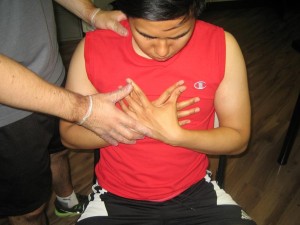The stabbing pain while breathing is often sharp and tends to worsen when the individual breathes deeply. There are various conditions and some are serious that can lead to stabbing pain while breathing. Take note that there are also disorders that can cause the similar pain that do not involve the lungs. If an individual suffers from stabbing pain while breathing, he/she must consult a doctor so that proper evaluation can be carried out.
If an individual experiences stabbing pain while breathing, you can provide the appropriate first aid measures to alleviate the pain. You can register for first aid training so that you are prepared to handle pain in other related conditions effectively.
Pneumothorax
Pneumothorax is a condition that involves the accumulation of air into the pleural space or the area amidst the lung and chest cavity that leads to a collapsed lung. The breakdown can be incomplete or complete and often due to injury or disease such as emphysema which causes the formation of a gap in the pleural space that ends up filled with air.
It is important to note that a recurrent pneumothorax can also develop and there is no exact cause. The signs and symptoms are subjected to the severity of the collapse and can include stabbing pain, shortness of breath, dry cough and pain in the abdomen or shoulder. In some cases, it can lead to cardiac arrest, shock and even death.
Pleurisy

The pleura basically cover the lungs and the chest cavity. If pleurisy develops, it involves the inflammation between these two layers. The inflammation will cause the layers to rub on each other, resulting to the distinctive sharp stabbing pain that occurs while the individual breathes.
Underlying medical conditions such as pneumonia, flu and other infections can also cause pleurisy. The other possible causes include lupus, tuberculosis, open heart surgeries, injured ribs and chest injuries. The accumulation of fluid between the swollen layers can occur which reduces the pain but can lead to a collapsed lung. The treatment for this condition focuses on eliminating the underlying cause and reducing the pain. In case a large pleural effusion develops, it would require draining.
Pulmonary embolism
Pulmonary embolism is an abrupt blockage of an artery in the lungs due to a blood clot that travels from another part in the body, usually in the legs. Always remember that pulmonary embolism is a life-threatening condition that can cause low oxygen levels in the blood which can damage the organs, permanently damage a region of the lung and even cause death if several clots or a large clot develops. The symptoms include stabbing pain while breathing, rapid heart rate and shortness of breath. This condition would surely require immediate medical care.
